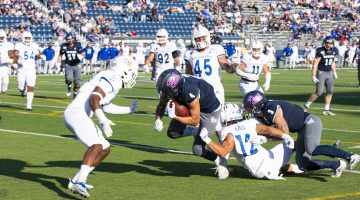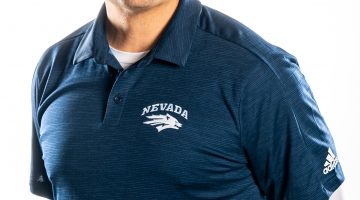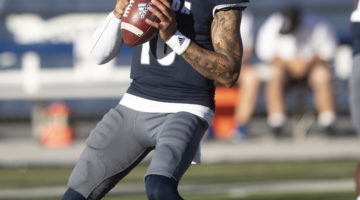by Jack Rieger
Nevada football’s dominance over UNLV has ended, as the Rebels painted the Fremont Cannon red on Saturday night for the second time in three years, beating Nevada 23-17.
Confidence is the world’s greatest performance enhancer, and UNLV entered the game with an abundance of it. The Rebel sideline showed excitement and energy that had been nonexistent for close to a decade, all of which seems to be a product of their new exuberant coach, Tony Sanchez.
“I’m so happy for our guys; I’m so happy for our university,” said Sanchez. “For our kids to be able to walk away with the cannon, second victory in a row and our first win in conference, that’s a big, big deal for our program.”
Sanchez is as animated of a coach as you will see in college football. After UNLV’s first touchdown the Rebel coach ran out on to the field and delivered a fist pump that would’ve impressed Tiger Woods. Throughout the game he was seen sprinting up and down the sideline barking orders to his team like an Army general would to his soldiers. His energy was clearly infectious, as UNLV outplayed Nevada for the majority of the game.
Nevada running back Don Jackson talked to reporters after the game about UNLV’s improvement from last season.
“They were definitely an improved team,” said Jackson. “They were a lot more disciplined than they were a year ago. I think that’s what helped them tonight. I don’t like this look that people think they’re a bad football team. They definitely got better from last year.”
Nevada struggled mightily to generate anything offensive, especially early on. The Wolf Pack had just two first downs in the first quarter to go along with 37 total yards. Nevada was on the verge of taking the lead late in the fourth quarter when Tyler Stewart’s pass was deflected at the line of scrimmage and then intercepted and returned for a touchdown by the Rebels’ Ryan McAleenan.
Advice for Nevada fans
The most obvious takeaway from Saturday’s game is that the rivalry has become more competitively balanced, mainly because UNLV has improved their play over the last few seasons. The days of Nevada soaking the cannon with coats of blue for up to eight consecutive years are history, but this isn’t necessarily a bad thing for Nevada football. In fact, I think UNLV’s competitiveness will enhance the quality of both programs.
There is a theory in economics that also supports this idea. Competition, according to Adam Smith’s economic theory, “causes commercial firms to develop new products, services and technologies, which would give consumers greater selection and better products.” If this concept is accurate, UNLV’s progression as an improving football team will compel Nevada to produce a better, more competitive product.
In other words, Nevada fans should embrace UNLV’s improvement as a football team, not dismiss it. Refrain from ranting on Twitter about how UNLV students are still living at home with their parents; it’s a sign of insecurity. Not only does UNLV’s development as a football team foreshadow Nevada’s progression, it also enhances a really poor Mountain West Conference.
In the history of Nevada and UNLV’s rivalry, several times each team has had a stretch of consecutive wins. From 1989 to 1993 Nevada won five straight matchups, and from 2000 to 2004 UNLV tipped the scales in their favor, winning five in a row. And most recently from 2005 to 2012, Nevada went on a run of eight straight wins. Now for the first time in recent memory the playing field is level, and the cannon is up for grabs.
Jack Rieger can be reached at jrieger@sagebrush.unr.edu and on Twitter @JackRieger.













